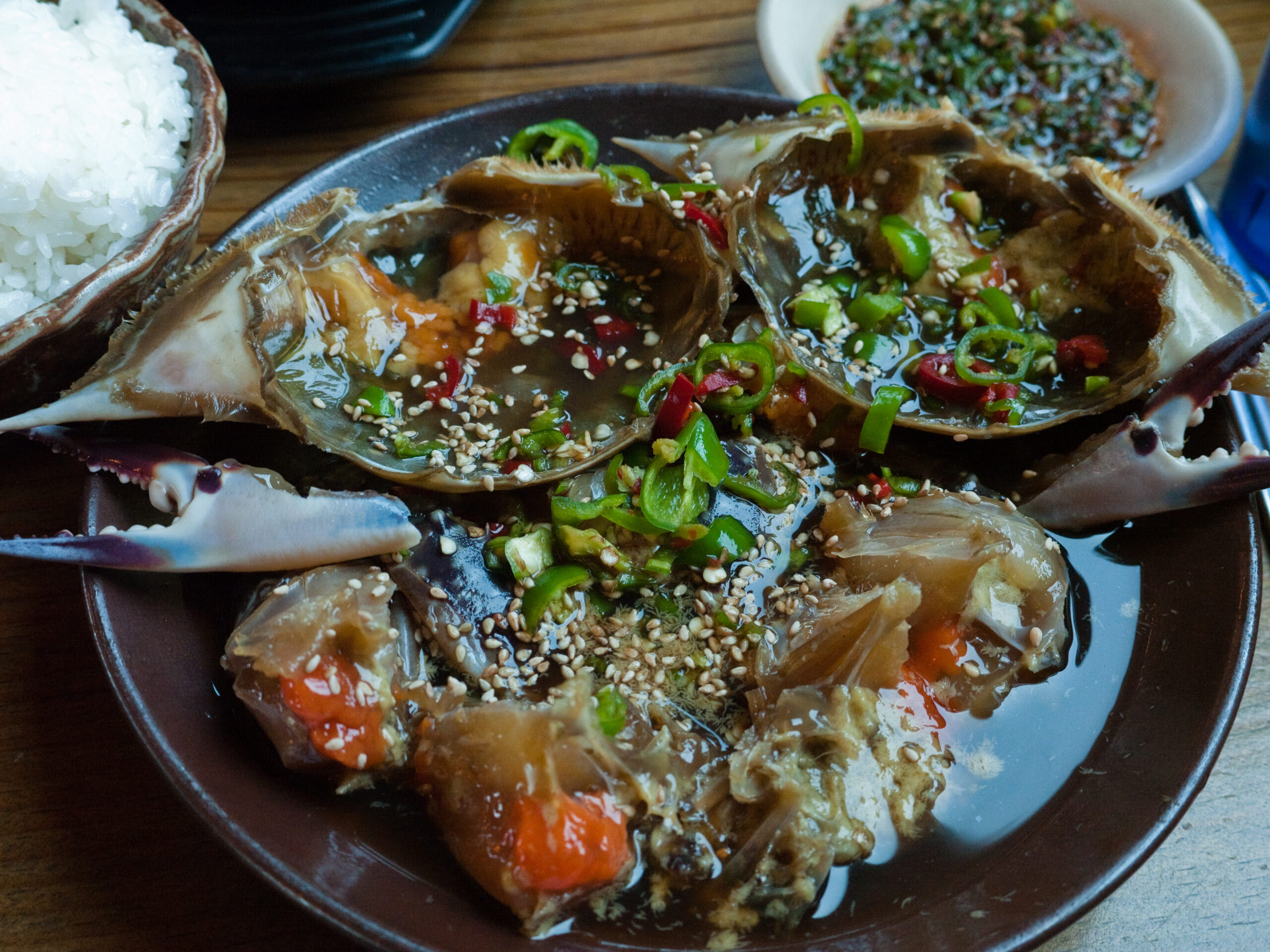
What is Raw Marinated Crab?
Raw marinated crab is a culinary delicacy that has captured the palates of seafood enthusiasts around the globe. Originating mainly from East Asian cuisines, particularly Korean and Japanese, this dish involves the careful preparation of fresh, live crabs that are marinated to create a fusion of flavors. The use of raw marinated crab showcases the balance of umami and freshness inherent in seafood, elevating it to a revered status in several cultures.
The traditional method of preparing raw marinated crab involves selecting high-quality crabs, often blue crabs or hairy crabs, which are prized for their tender meat and rich flavor. Once harvested, the crabs are cleaned and sometimes lightly steamed to facilitate easier handling and enhance their taste. The crabs are then soaked in a marinade that typically consists of soy sauce, sesame oil, rice vinegar, and various spices, including garlic and red pepper. This marinade not only enhances the natural taste of the crab but also infuses it with aromatic qualities that create a delightful experience for the senses.
Cultural significance plays a vital role in the appreciation of raw marinated crab. In Korean cuisine, for example, this dish, known as “gejang,” is often served as part of a larger feast, symbolizing generosity and sharing among family and friends. The preparation methods can vary depending on regional ingredients and culinary traditions, leading to unique flavor profiles. In regions where this delicacy is popular, local variations may incorporate specific spices or herbs, reflecting the integration of local tastes. Such diversity showcases the adaptability of raw marinated crab, making it a versatile dish that can be tailored to fit the preferences of various cultures and culinary contexts.
Health Benefits of Eating Raw Marinated Crab
Raw marinated crab is not only a delicacy enjoyed by many but also offers an impressive array of health benefits. One of the primary advantages of consuming this seafood is its rich protein content. Crab meat is a high-quality source of protein, containing essential amino acids necessary for the body’s growth and repair. A diet that includes high-protein foods can support muscle maintenance and overall health, making raw marinated crab an excellent choice for those seeking nutritious options.
In addition to being protein-rich, raw marinated crab is an excellent source of omega-3 fatty acids. These healthy fats are known for their anti-inflammatory properties and play a crucial role in heart health. Regular consumption of omega-3s can help lower blood pressure, reduce cholesterol levels, and diminish the risk of cardiovascular diseases. Therefore, integrating raw marinated crab into one’s diet can contribute significantly to maintaining a healthy lifestyle.
Moreover, this seafood is packed with essential vitamins and minerals. It contains vitamin B12, which is vital for nerve function and blood cell formation, as well as selenium and zinc, which support immune function and overall vitality. With these nutrients, raw marinated crab can be a delicious way to enhance nutritional intake and promote holistic health.
While enjoying the delights of raw crab, it is important to be aware of safety concerns associated with the consumption of raw seafood. Potential risks include the presence of parasites or bacteria. To mitigate these risks, it is advisable to source crab from reputable suppliers and ensure proper handling and storage. Choosing high-quality, fresh crab and following safe consumption practices can enhance the culinary experience while minimizing health risks associated with eating raw marinated crab.

How to Prepare Raw Marinated Crab at Home
Preparing raw marinated crab at home can be an exciting culinary project that enhances any gathering or special occasion. To begin with, selecting the right type of crab is essential. Look for fresh varieties such as blue crab or Dungeness crab, which are commonly used in raw preparations. Ensure the crab is alive prior to cooking, as this freshness is crucial for flavor and safety. Once you have selected your crab, proceed to clean it properly. Rinse it under cold running water and gently scrub the shell to remove any sand or debris. Place the crab in a large pot of boiling water for approximately five to seven minutes; this will facilitate easier removal of the meat.
After boiling, let the crab cool, then carefully remove the meat from the shell. Focus on capturing the delicate meat from the legs and body, discarding any inedible parts. Now, you will need to prepare the marinade, an essential aspect of raw marinated crab that infuses the dish with vibrant flavors. A simple marinade can consist of soy sauce, citrus juice (like lemon or lime), sesame oil, garlic, and finely chopped scallions. Mixing these ingredients creates a balanced flavor profile that complements the sweetness of the crab meat.
Place the cleaned crab meat in a bowl and pour the marinade over it, ensuring that every piece is well-coated. Cover the bowl with plastic wrap and refrigerate for at least 30 minutes to allow the flavors to meld together. For an optimal taste experience, marinating for about one to two hours is recommended. When ready to serve, present the raw marinated crab in an attractive manner on a chilled plate, garnishing with fresh herbs or edible flowers. This dish not only promises an exquisite flavor, but it also offers a stunning presentation that is sure to impress your guests.
Exploring Variations and Pairings
Raw marinated crab, known for its delicate flavor and unique texture, exhibits a myriad of variations across different cuisines globally. Each region adds its twist, influenced by local ingredients and culinary traditions. For example, in Korea, a popular dish called ‘ganjang gejang’ features blue crabs marinated in a savory soy sauce mixture, which imparts a distinct umami flavor. The sweetness of the crab combines beautifully with the saltiness of the marinade, creating a dish that is both cherished and revered.
In Japan, ‘kani’ is often dressed in a citrus-based marinade, enhancing the freshness of the crab meat. This preparation, commonly known as ‘kani-su,’ incorporates vinegar and wasabi, producing a palate-cleansing contrast to the seafood’s richness. The use of yuzu, a Japanese citrus fruit, in marinades highlights regional availability while adding an aromatic twist that elevates the dish to new heights.
When it comes to perfect pairings, serving suggestions for raw marinated crab extend beyond merely enjoying it on its own. A light, crisp white wine or a sparkling sake complements the freshness of the crab, while enhancing the overall dining experience. Side dishes such as cucumber salads or pickled vegetables provide a refreshing counterbalance that cuts through the richness of the marinated crab. Moreover, incorporating additional seafood delicacies, such as oysters or shrimp, can create an enticing seafood platter that caters to various palates. The contrasting textures of crunchy vegetables and tender crab further enhance the overall flavor profile, making for a memorable meal.
In essence, exploring the diverse interpretations and pairings of raw marinated crab around the world allows food enthusiasts to appreciate the culinary artistry involved in its preparation, making each dining experience remarkable.





